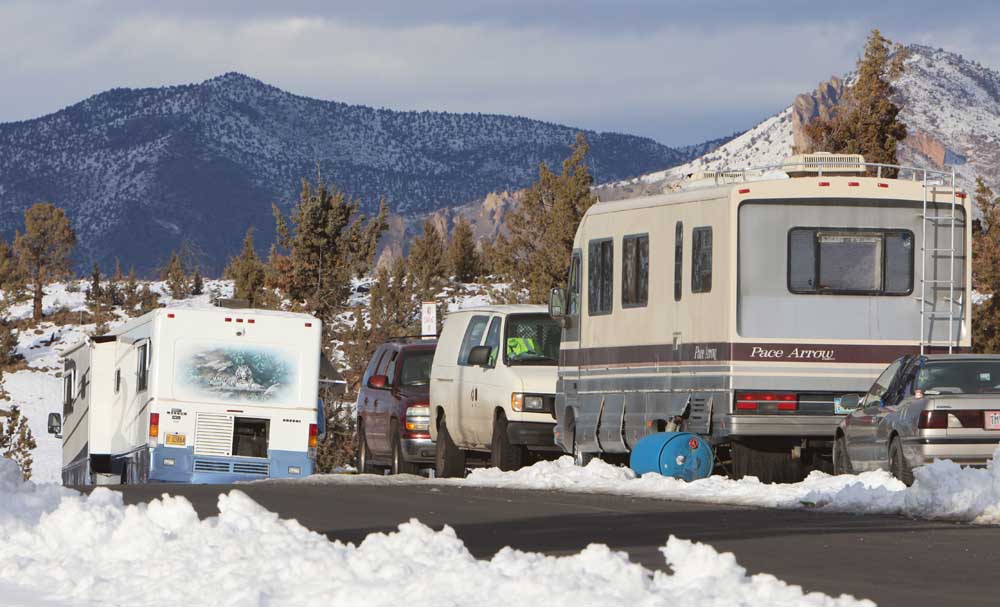Redmond considers its first regulations on homeless camping
Published 10:15 am Thursday, February 23, 2023

- Campers parked on the east side of northeast 17th Street in Redmond in December.
Redmond city councilors are set to debate rules around when, where and how people without permanent housing can live within city limits.
Proposed rules will be discussed Tuesday at the council’s scheduled meeting.
Currently, the city has no camping regulations for people without permanent homes. It has until a state-mandated deadline of July 1 to craft rules.
The city of Bend adopted its own camping regulations last year after months of public meetings and input.
At a Feb. 14 council meeting, Redmond city staff proposed banning camping in buildings or structures on developed portions of public park areas, city hall
property, public parking lots and on sidewalks when
campers would reduce the width of sidewalks to less than 5 feet.
Staff and councilors also discussed banning camping from Redmond’s major commercial zones, including from Fred Meyer north to Kingwood Avenue, and the major east/west arterial along Glacier and Highland avenues. They also hope to ban camping along U.S. Highway 97 through town.
Additionally, staff proposed banning camping within 500 feet of utility facilities, safe parking program sites and any schools, child care facilities or permitted homeless shelters.
“These provide some guidance to enable us to take action if it’s warranted,” said John Roberts, deputy city manager for Redmond.
But, these proposals are not definite. The City Council is expected to debate details Tuesday and could continue the discussion at later meetings.
According to City Attorney Keith Leitz, staff have been working on the regulations for nearly a year — and nothing is yet set in stone.
“500 feet is not a magic answer that’s come down from above,” said Redmond Mayor Ed Fitch.
“It is an estimate on what might be appropriate. It’s not the final answer.”
According to Fitch, the city needs to have regulations in place so those experiencing homelessness and local community members have a clear set of rules.
Fitch said the city has a legal and fiduciary duty to implement regulations that balance the needs of the community and the rights of people who don’t have a place to rest and sleep. “It’s not an easy fix,” Fitch said.
Services and businesses
Service providers also recognized that it’s not easy to create rules and regulations, but acknowledged that they’re necessary — as long as officials don’t get carried away.
“They really packaged a lot of stuff together,” said Rick Russell, pastor of Mountain View Fellowship Church and director of the Redmond Safe Parking Program.
There are some rules that benefit the safe parking program. The new rules would not only create a no-camping zone within 500 feet of existing safe parking sites, it would open more areas for hosting.
“We think we have one business coming online specifically because of these changes,” Russell said. “It’s been a reassurance to some of the other potential host sites that we’re talking with.”
Branegan Dixon, owner of the Redmond Athletic Club and a former City Council candidate, is one such interested party and has started filling out paperwork to open a site for the safe parking program.
Dixon said the athletic club has had some membership cancellations and complaints from customers, due to people living out of five or six RVs and multiple cars parked near his business.
“There are definitely some impacts,” he said.
The safe parking rules that would prohibit camping within 500 feet of a site, he said, would allow him to help people experiencing homelessness who want to get their lives together while also preventing others from camping at his business.
Attempt to address camping
According to Roberts, the genesis for the new rules stem from the Martin v. Boise court case out of Idaho. The U.S. Court of Appeals for the Ninth Circuit ruled in 2018 that cities cannot criminalize camping or sleeping outdoors on public property if there are no alternatives.
The Oregon Legislature passed a bill in 2021 that city or county laws regarding “sitting, lying, sleeping or keeping warm and dry outdoors” on public property must be objectively reasonable.
Russell said it’s always easy to say where homeless people cannot be. The hard part is allowing space where it can occur. But, he applauded the city’s effort to create these rules.
“I think the concern for me is, will they exclude so many places that essentially they’ve outlawed being unhoused?” Russell said. “I don’t think they’re doing that.”
According to Andrew Hoeksema, Redmond director for Shepherd’s House Ministries and chair of the city housing and community development committee, fair rules and regulations are a positive.
“I think those distance restrictions are helpful,” he said. “Those codes exist to prevent conflict.”
Hoeksema doesn’t expect the rules to change the Shepherd’s House mission as it builds the city’s first year-round, low-barrier shelter and provides a better alternative to camping.
Many of the people who visit Shepherd’s House, he said, do so to avoid camping.
But, Hoeksema noted that many people experiencing homelessness don’t stop living outdoors when officials close or dismantle their camps. Instead, they just move somewhere else.








